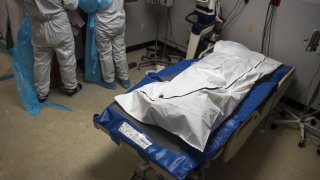
- The coronavirus has killed more than 300,000 people across the country as U.S. officials ship out the first of nearly 3 million doses of Pfizer's Covid-19 vaccine to distribution centers in all 50 states.
- The U.S. has reported at least 16 million total coronavirus cases, the most in the world, according to data compiled by Johns Hopkins University.
- As the U.S. grapples with devastating death tolls and surges in hospitalizations, a historic inoculation effort is also underway.
The coronavirus has killed more than 300,000 people across the country as U.S. officials ship out the first of nearly 3 million doses of Pfizer's Covid-19 vaccine to distribution centers in all 50 states.
The U.S. has reported at least 16 million total coronavirus cases, the most in the world, according to data compiled by Johns Hopkins University. Officials reported more than 2,300 deaths on Saturday and more than 3,300 deaths on Friday as new infections continue to explode across the country.
As the U.S. grapples with devastating death tolls and surges in hospitalizations, a historic inoculation effort is underway.
The Food and Drug Administration on Friday granted emergency use authorization for the vaccine developed by Pfizer and BioNTech based on data showing it was 95% effective. CDC Director Dr. Robert Redfield signed off on the vaccine Saturday night, allowing inoculations to officially move forward for people ages 16 or older.
The first doses will go to health-care workers and residents in long-term care facilities.
Money Report
The FDA is also releasing a data assessment this week for Moderna's vaccine and reviewing the company's request for emergency use authorization. If approved, Moderna's vaccine could be administered as early as Dec. 21 and help the U.S. provide 20 million vaccinations in December, 50 million by the end of January and 100 million by the end of February.
Health officials say that roughly 75%-80% of the U.S. population must get vaccinated to achieve herd immunity, or a period where enough people are protected so that the virus can be contained.
Dr. Moncef Slaoui, chief medical advisor to Operation Warp Speed, said Sunday that he hopes to achieve herd immunity between May and June.
However, health officials are concerned about public doubt over the efficacy and safety of the speedy vaccine rollout, with one poll showing that only about half of Americans say they want a shot, while a quarter aren't sure about it and another quarter say they won't get one.
Even with the vaccine rollout, health researchers forecast that the U.S. death toll could double and reach a cumulative 539,000 by April 1, and are urging people to wear masks and limit gatherings to manage the spread of the virus.
Vaccine distribution will only reduce the death toll by 9,000 by April 1, while a rapid vaccine rollout targeting high-risk individuals could save a further 14,000 lives, according to a report published by the Institute for Health Metrics and Evaluation at the University of Washington's School of Medicine.
UMass Memorial Health Care, which operates hospitals in central Massachusetts, has seen a major influx of Covid-19 patients in its hospitals after the Thanksgiving holiday, Dr. Eric Dickson, CEO of UMass Memorial Health Care, told CNBC on Friday.
It's become harder for hospitals to maintain staffing as some employees contract Covid-19 and are forced to quarantine.
The health system is planning to once again bring in additional refrigerated trucks to serve as temporary mortuaries to store the dead, Dickson said. Some of UMass Memorial's morgues have had to transfer bodies of Covid-19 victims from one hospital to another after running out of space.

"The worst is unfortunately yet to come," Dickson said. "There is nothing to suggest that the rate of hospitalizations is going to slow down. So at this point, we're absolutely confident that this will be worse than the first surge."
Dickson urged "the public to do everything they can to prevent the spread of this infection for the next two months" to prevent additional strain on the health-care system while coronavirus vaccines are delivered to health-care workers and the most vulnerable.
"If you can give us those two months, we'll bring the hospitalizations down, we'll have enough room, we'll have the workforce to deliver the vaccine and we'll be out of this thing in early summer," Dickson said.
"But if we don't get the public's help during those two months, it's going to be a horrible, horrible long winter because there will be a lot of people dying that didn't have to die," he said.






